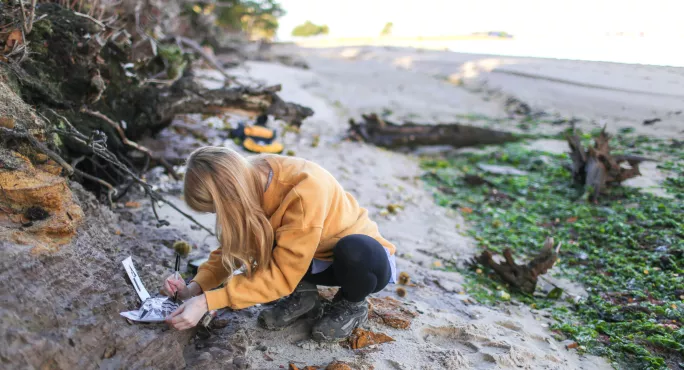New geography teachers lack fieldwork ‘confidence’

New geography teachers lack the confidence to teach fieldwork to students after having limited experience of it during the pandemic, a report warns.
The Geographical Association report warns that the limited fieldwork opportunities available to early career teachers during their training and beyond is “impacting their confidence and subject knowledge to design and lead fieldwork in the future”.
Prior to exams being cancelled in 2021, the exam regulator Ofqual removed the requirement for schools to declare that they had given GCSE, AS- and A-level geography students a set number of fieldwork days.
And the requirement for GCSE and AS-level students to answer exam questions relating to their own fieldwork experience was also removed. Both of these changes will be retained for 2022 exams.
- GCSEs 2022: ‘Potential inequality’ with geography exams is ‘evident’
- Covid: Can geography field trips recover?
- Geography: Why teachers need to fight for field trips
However, policymakers must reverse the changes for exams in 2023 and “reinforce” the requirements for fieldwork within the curriculum, according to the report, The professional needs and views of teachers of geography.
Otherwise, it says, GCSE and A-level fieldwork “could become more marginalised in the coming years as a catch-up narrative prevails”.
Alan Kinder, chief executive of the Geographical Association and co-author of the report, described the current situation - where GCSE and A-Level students have to answer theoretical questions about fieldwork without having had to do practical work themselves - as “the worst of all possible worlds”, and said fieldwork requirements needed to return “at the earliest opportunity”.
He added that this requirement should then be “stridently” flagged by policymakers to make a strong statement about its importance.
New teachers will have ‘a piece of the jigsaw missing’
The Geographical Association’s report, which is based on an online survey and focus group discussions, says that teachers who trained during the academic years 2019-20 and 2020-21 were “significantly impacted by the Covid-19 pandemic”.
It says that, particularly for the 2019-20 cohort, trainees were heavily restricted at a time when many would usually be expected to be teaching two-thirds of a timetable and “gaining significant practice in lesson planning, lesson delivery, behaviour management, assessment and fieldwork”.
Dr Nicola Warren-Lee, a geography PGCE lead at the University of Bristol, said that, since the pandemic first hit, the fieldwork opportunities on teaching courses had been reduced.
She said: “We can discuss it and talk about techniques, but that practical experience is invaluable.
“Covid particularly hit the residential trips. The residential things were a massive part of the training. The learning about health and safety, the risk, how to organise kids - it’s a really holistic experience.”
When asked how new teachers who trained during the pandemic would gain this experience, Dr Warren-Lee said: “They’ll have to gradually build up their confidence in school, relying on senior, experienced staff, and learn on the job. But I’ve known schools where there’s one geographer in the department. It’s there that there will be more challenge.”
Mr Kinder added that while fieldwork continued to be marginalised in the curriculum, there was a risk that the lack of confidence and experience among new teachers could become “baked in”, adding: “Unless something’s done, then new teachers are going to progress in their careers with a piece of the jigsaw missing.”
Fieldwork is ‘fundamental to geography’
Several geography teachers that Tes spoke to stressed the importance of the work for their students.
David Rogers, a geography teacher at The Littlehampton Academy in West Sussex, said fieldwork used to be “the thing that captured students”, but that generally, his department had replaced residential trips with local fieldwork because of ongoing Covid restrictions.
Catherine Owen, head of geography at King Alfred School and Academy, Somerset, said it was “so important” to get children doing fieldwork out in the classroom, as “they’ve missed out on so much” during the pandemic.
Mr Kinder’s co-author on the report, Dr Emma Rawlings Smith, said the return of fieldwork requirements for exams was vital to students of the subject and new teachers.
She said that for school pupils, fieldwork was “fundamental to geography” and that if its importance was stressed by the Department for Education and Ofqual, then new teachers would “get the opportunity to run and experience fieldwork again”.
A spokesperson for the DfE said that it fully intended for exams to return to normal in 2023, “including for practical and non-examined assessments like fieldwork in geography.”
They added: “We recognise the importance of fieldwork in geography, both for teachers’ development and for children and young people’s learning and wellbeing.
“Requirements on fieldwork outside of school were removed from GCSE assessments this year owing to the challenges of the pandemic, however it was still encouraged wherever it was possible to do so safely and in line with Covid restrictions.”
You need a Tes subscription to read this article
Subscribe now to read this article and get other subscriber-only content:
- Unlimited access to all Tes magazine content
- Exclusive subscriber-only stories
- Award-winning email newsletters
Already a subscriber? Log in
You need a subscription to read this article
Subscribe now to read this article and get other subscriber-only content, including:
- Unlimited access to all Tes magazine content
- Exclusive subscriber-only stories
- Award-winning email newsletters
topics in this article



